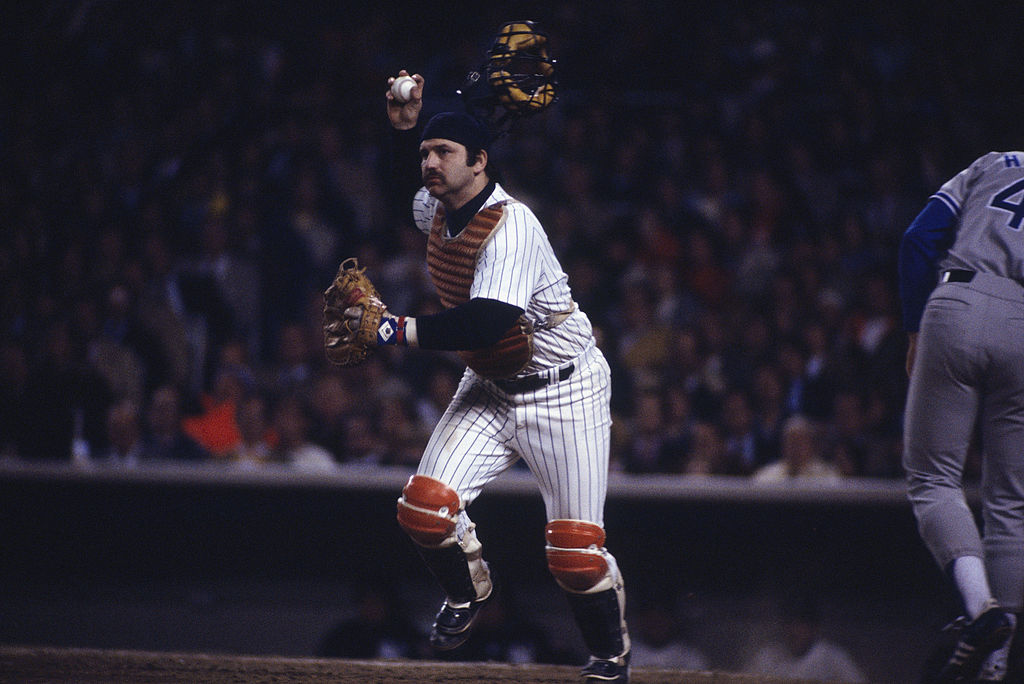MLB
Thurman Munson’s Tragic Death Robbed the New York Yankees of Their Heart and Soul

Over the course of their franchise history, the New York Yankees have had plenty of legendary players. While the likes of Babe Ruth, Lou Gehrig, and Derek Jeter will live on in baseball lore, one specific name will live on in New York sporting lore: Thurman Munson.
During his time in the Bronx, Munson developed into a star player and the New York Yankees’ captain. His life and career, however, came to a tragic end when the catcher died in a plane crash.
Thurman Munson became a star with the New York Yankees
RELATED: How Much Money Did Babe Ruth Make During His Major League Baseball Career?
In order to stand out in pinstripes, you have to do something notable on the field. During his time with the New York Yankees, Thurman Munson did just that.
The Yankees selected Munson with the fourth overall pick of the 1968 MLB draft; the catcher spent one season in the minor leagues before making his big league debut at the tail end of the 1969 season. During the following offseason, the New York brass traded away their backup catcher, giving Thurman a place on the roster.
In 1970, Munson seized the starting job with both hands; he finished the year with a .302 batting average, 137 hits, 80 assists in the field, and Rookie of the Year honors. Before long, the catcher developed into a perennial all-star and Gold Glove-winner.
Before the 1976 campaign, the Yankees named Munson their captain, making him the first player to assume the position since Lou Gehrig. While that could have been a burden, the catcher took his name to the next level. Munson claimed the 1976 AL MVP award, but the Bronx Bombers fell in the World Series; the followed that defeat, however, with two consecutive championships.
The tragic death of Thurman Munson
After two straight World Series titles, 1979 proved to be a tough season for Thurman Munson and the New York Yankees. In August, however, things would get even worse.
Earlier in his career, Munson had purchased a plane and begun learning to fly. While the Yankees captain hoped the hobby would make it easier to spend time with his family, it ultimately led to his tragic death.
As recorded in a National Transportation Safety Board report, Munson was “practicing touch-and-go landings” on the afternoon of August 2, 1979. During one attempt, however, the plane came too close to the ground without lowering its flaps; it clipped the treetops and touched down in a pasture before striking a stump, skidding onto a road, and bursting into flames.
While Munson’s two passengers survived, the Yankees captain wasn’t so lucky. According to the New York Times, he suffered a broken neck and ultimately died from asphyxiation, trapped in the burning plane.
The New York Yankees never forgot their late captain
Related: Babe Ruth’s Life Is More Tragic Than You Think
Understandably, the New York Yankees were shaken by the loss of Thurman Munson. Not only was he a quality player but, as Moss Klein of the Star-Ledger remembered, the captain was the “heart and soul” of the club.
On the day after Munson’s death, the Yankees paid tribute to their fallen teammate by leaving the catcher’s position unfilled when they took the field; Muson’s number 15 was also immediately retired by the club. He eventually received a plaque in Monument Park, and his locker remained unoccupied until the Yankees moved out of Yankee Stadium. Today, it sits in the team’s museum.
In 1979, Thurman Munson’s tragic death robbed the New York Yankees of their beloved captain. More than 40 years later, though, he hasn’t been forgotten.
Stats courtesy of Baseball-Reference











